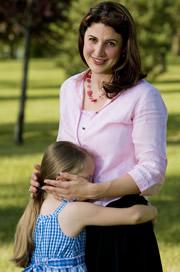 Melanie Boivin’s daughter Flavie cannot make eggs of her own.AFP PHOTO/David BOILY
Melanie Boivin’s daughter Flavie cannot make eggs of her own.AFP PHOTO/David BOILYA seven-year-old girl in Canada might one day give birth to her genetic half-sibling. The girl's mother has donated her own eggs to give the child, who was born with a disease that affects her ovaries, the chance to have children of her own.
Melanie Boivin, a 35-year-old lawyer from Montreal, secured legal permission for the move after realizing that her daughter, Flavie, could not have children without donor eggs. Flavie has Turner syndrome, a rare condition in which one of the X chromosomes is missing, causing ovaries to malfunction.
The unprecedented legal agreement means that the eggs could remain frozen for 20 years, until Flavie decides to start a family of her own. If she uses the eggs and has a successful pregnancy, the resulting baby will be her half-sister or -brother. Mothers have previously acted as surrogates for their daughters, giving birth to their own grandchildren.
“I do not want to oblige her to use the eggs, I want to give her the option.”
Melanie Boivin
"I do not want to oblige her to use the eggs, I want to give her the option," Boivin says. "The thing I was most sad about Flavie's syndrome was her fertility issue. If she had needed another organ such as a kidney, I would volunteer without any hesitation at all, and it is the same kind of thought process for this."
Chances are high
Should Flavie decide to use her mother's eggs, her chances of giving birth will be good, says Seang Lin Tan, the fertility expert at McGill University in Montreal who treated Boivin. Turner syndrome does not affect the womb, meaning that it should be possible to implant an embryo after in vitro fertilization (IVF).
"The chances of carrying a baby to term are very high," Tan says, adding that doctors should screen the embryos for the Turner syndrome abnormality. Although genetic, Turner syndrome is not usually directly inherited, and Flavie has a younger sister who is not affected.
ADVERTISEMENT
Boivin secured legal permission for the move after winning the approval of McGill University's ethical committee. There is no legal time limit in Canada on egg storage. Britain, for example, imposes a ten-year cap.
Flavie will need further ethical oversight if she decides to use eggs. "It is very difficult to imagine how I will react when the situation arises," says Boivin. "Flavie will need to make the decision and if she wants to go further I will be supportive and will see this child as any other grandchild."
Visit our donatesfrozeneggsto.html">newsblog to read and post comments about this story.
